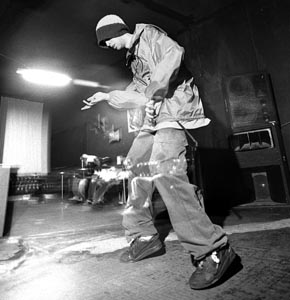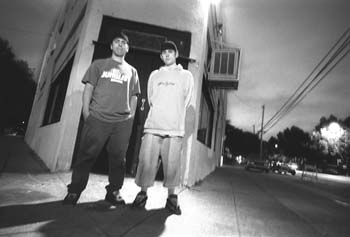Late-Night Jungle
At 301 Stockton, the drum 'n' bass
By Michelle Goldberg
CRAZED BREAKBEATS and machine-gun rhythms pour out of the DJ booth at 301 Stockton in San Jose. A half-dozen kids in baggy jeans and expensive sneakers dance around the club, twirling and jerking, hands jabbing the air, feet moving too fast to keep track of.
The bartender makes popcorn instead of cocktails, and a huge screen shows Star Wars trailers and Japanese anime with English subtitles. Several of the girls gyrating on the raised stage stare at a cartoon, following its spacey apocalyptic plot as they grind their hips and nod their heads. At nearly 1:30am on a Sunday night, as all the city's other clubs announce last call, 301 Stockton's two rooms are just starting to fill up, and the dark, alcohol-free space feels like a cross between a sexy underground disco and a hipster rec room.
Held at San Jose's only after-hours club, 301 Stockton, Ghetto Junglism night, which started June 21, is the city's first weekly drum 'n' bass party. Steeped as it is in high-tech culture, Silicon Valley should be a Mecca for electronic music. But until recently, due largely to zoning restrictions on late-night parties, San Jose's club scene has stagnated compared to San Francisco's. Now, thanks to a passionate club owner and a crop of DJs intent on building a homegrown scene, that may be about to change.
"San Jose supports the San Francisco clubs," says 301 Stockton owner Paul Orozco. "We want to keep people from San Jose here and bring people from San Francisco to San Jose. That's unheard of right now, but if we do things right, there will be a reason for people from San Francisco to come down here to party."
Ghetto Junglism was begun by Thad Jones and Noah Ruiz, a.k.a. DJs Hak and Siphon. "People think that in order to party you have to go to San Francisco," Jones says. "That's why we called our party Ghetto Junglism, because San Jose is like the ghetto of San Francisco. Everyone's got the attitude that in order to have a good time, you have to be in San Francisco."
Jones, who works at Solid Grooves record store in San Jose, gets the local kids who buy music from him to spin at his club night. "It goes full circle," he explains. "The only way to keep things going is to let the people who buy records play, and then they in turn buy more records. Everything's connected.
"We put on people who would never have a chance in hell of spinning in the city. It's payback. I remember how hard it was for me when I started spinning jungle, a music form that a lot of people didn't want to hear at the time. By giving locals a chance to open up, I give respect. It's about exposing people down here to the music."
The second Ghetto Junglism party was 19-year-old Mark Arroyo's first gig ever. There were a few awkward moments between records, but for the most part, Arroyo tore the joint up, spinning drum 'n' bass that was hard-core enough for purists but funky enough to keep novices dancing. "The vibe everybody gave off was hella cool," he tells me, grinning, after his set.
Those most open to jungle, at least in San Jose, tend to be part of the under-21 crowd, a demographic that works perfectly for 301 Stockton. Orozco doesn't have a liquor license right now and doesn't expect to get one until October, and until then, the club is for ages 18 and over.
"My goal is just to have a night where I can play my own music and not have to answer to anyone else," Jones says. "I've been spinning jungle since '93, and this has been my ultimate goal: to have my own club. But I dared not do it at any place that's 21-and-over, because most of the people that appreciate my music are under 21."
Though Jones is 28, and his partner, Ruiz, is 27, he still says that "those over 21 are pretty set in their ways. They've been going to house-music nights for years. The younger kids who are just turning 18 and are just discovering music have an unadulterated view. They're open-minded to just about anything that you can throw at them."
Spin Doctors: DJs Noah Ruiz (left) and and Thad Jones
INDEED, THOUGH jungle, or drum 'n' bass, can now be heard as background music in Volkswagen commercials, the kind of harsh, polyrhythmic sounds that the DJs at Ghetto Junglism spin require a bit of acclimation by those raised on sunny house music or rolling, mellow hip-hop.
Drum 'n' bass originated in the UK's poorer black neighborhoods, just as rap did in the U.S., and its harsh sound even sparked a bit of a panic in the mainstream British press. The music grew in popularity in the U.S. as ravers tired of the otherworldly optimism of house music and started longing for a sound that reflected their postindustrial cityscape.
The bursts of bass that emanate from the Ghetto Junglism DJs seem like the perfect soundtrack for the rusty, rundown neighborhood that surrounds 301 Stockton and for the shiny prefab futurism of Silicon Valley's high-tech companies.
"When you live next door to Apple--and many of your friends work at Adobe--you can't help feel that technology is going to take over," says Jones, who is majoring in hypermedia at San Jose State University. "Jungle is futuristic. It's all about technology, all about pushing forward and all about hella bass."
And in the South Bay, it's all night--301 Stockton stays open until 5, 6 or 7am, depending on when partiers get too tired to keep dancing.
Because 301 Stockton (which used to be Bucks, a gay C&W bar) was a club before the city instituted its current zoning laws, it has "legal nonconforming status," according to San Jose city planner Jeff Roch. While a new club that wanted to stay open all night would have to petition the city Planning Commission, because of 301 Stockton's legal standing--a kind of "grandfather clause," Orozco says--the club doesn't need a permit to go on till dawn. "When I first bought the club last August, we didn't close from Thursday to Monday," Orozco tells me.
THOUGH THE CROWD at Ghetto Junglism is mostly b-boys and dressed-down ravers, other nights at 301 Stockton attract different subcultures. Monday is Azucar, a gay Latino dance night. Tuesdays play host to a techno and trance club called Progression. Wednesday is Plastique, a party for fashion queens, "where faggots and fashion meet," according to a flier. Thursdays highlight soul, funk and rare grooves. Fridays are reserved for one-off parties, and Saturdays feature "The 301 All-Stars": local turntablists Lenny Ray, Mustafa, DJ Mars and Arturo.
"I want to live in the 21st century, not the 19th century," Orozco declares. "San Jose needs mavericks and buccaneers. We're the largest hick town in the nation, the biggest city without a major nightclub. I want to bring up local talent and promoters and give them an opportunity where no one else will take the chance. I want to bring talent from abroad, because they won't come to San Jose unless they have someplace like this to play."
For all his complaints about the South Bay, Orozco is devoted to his hometown. A San Jose High School graduate, he's lived in San Jose for all of his 38 years.
"I believe in this city," Orozco says. "I want to the expose the San Jose community to diverse lifestyles and bring them all together in harmony. This is a place where you can see a 45-year-old, 6-foot-tall white drag queen dancing with an 18-year-old Mexican club kid. We're changing the landscape of nightclubbing in San Jose."
[ San Jose | Metroactive Central | Archives ]
Copyright © Metro Publishing Inc. Maintained by Boulevards New Media.
![]()

Christopher Gardner
groove rolls on all night long
Christopher Gardner
want to give locals a chance.
Ghetto Junglism happens every Sunday at 10pm at 301 Stockton St. (at Julian Street), San Jose. Admission is $5. (408/301-3934)
From the July 16-22, 1998 issue of Metro.
![[Metroactive Music]](/music/gifs/music468.gif)